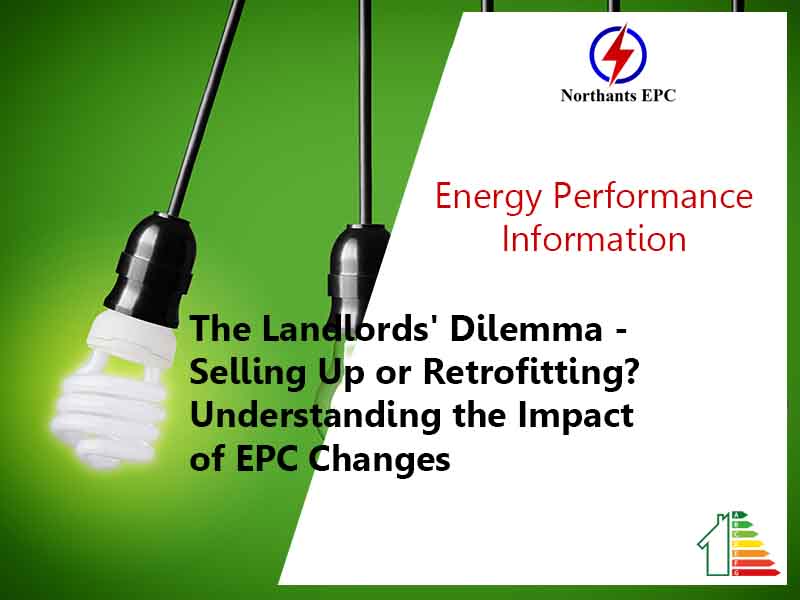The Landlords’ Dilemma – Selling Up or Retrofitting? Understanding the Impact of EPC Changes
Introduction
The landscape for UK landlords is facing a significant shift as new regulations loom on the horizon. According to research from Mortgage Advice Bureau (MAB), almost two-thirds of landlords are considering selling their properties due to the financial strain of meeting the minimum Energy Performance Certificate (EPC) level required by the forthcoming laws. The deadline set for landlords to retrofit their properties to a minimum EPC C rating is expected to be 2028. However, the lack of clarity on available assistance is leaving many landlords anxious about how they will afford the necessary changes.
The Current Situation
At present, landlords must maintain a minimum energy efficiency rating of an E to rent out their properties. There are exemptions for properties where retrofitting to this level would cost more than £3,500. A similar exemption is expected to be announced for the new enhanced level from E to C, with a set cost of £10,000. On average, it is estimated that retrofitting a property to meet the EPC C level will cost around £4,700.
Landlords’ Concerns
The impending changes have sparked concerns among landlords regarding the financial burden they will face. The MAB research reveals that 25 percent of landlords believe they may not be able to afford the necessary upgrades, while 34 percent are seriously considering selling their properties instead of retrofitting.
Furthermore, a third of landlords are considering passing on the upgrade costs to tenants, while others have already done so for previous upgrades. As landlords grapple with a substantial bill and a race against time, one-fifth of them are hoping for additional assistance to mitigate the cost of energy performance upgrades.
Government Initiatives and the Landlords’ Plight
The UK government has been emphasizing retrofitting and renewable energy through schemes like the ‘Green Home Grants’ and the newly announced ‘Great British Insulation Scheme’ (formerly ECO+). However, little attention has been given to policies, announcements, or clarity for landlords, leaving them uncertain about which upgrades will be most beneficial.
Potential Solutions
In the MAB survey, some landlords mentioned they plan to install smart meters (26 percent) and LED lighting (25 percent) to achieve a grade C rating. Surprisingly, only 16 percent have sought professional advice to determine the most effective changes for their properties.
Traditional methods to improve EPC ratings, such as installing modern boilers and additional insulation, were less popular but are still being considered by some landlords.
Challenges and Timing
Approximately one-third of landlords find the cost of upgrading extremely concerning, especially when faced with the recent economic climate that includes rising interest rates and increased living costs. Even if the government decides to delay the proposed 2028 deadline, finding the necessary funds for upgrades remains a challenge.
Ben Thompson, the deputy chief executive of Mortgage Advice Bureau, stresses the importance of efficient housing to meet climate goals and lower utility bills for renters. However, he acknowledges the struggles faced by landlords, urging for more advice, guidance, and assistance from the government.
Conclusion
– Almost two-thirds of UK landlords are considering selling their properties due to the financial strain of meeting the minimum Energy Performance Certificate (EPC) level required by new regulations.
– The deadline for landlords to retrofit their properties to a minimum EPC C rating is expected to be 2028.
– Lack of clarity on available assistance is leaving many landlords anxious about affording the necessary changes.
– Landlords currently need a minimum energy efficiency rating of E to rent out their properties, with exemptions for costs exceeding £3,500 to retrofit to this level.
– A similar exemption for the new EPC C level is expected to be set at £10,000, with the average cost to retrofit around £4,700.
– About 25% of landlords believe they may not afford the upgrades, and 34% are considering selling their properties instead of retrofitting.
– Some landlords are considering passing the upgrade costs to tenants, while others have already done so for previous upgrades.
– One-fifth of landlords are hoping for additional assistance to offset the cost of energy performance upgrades.
– The government has focused on retrofitting and renewable energy, but little attention has been given to policies and clarity for landlords.
– In a survey, 26% of landlords plan to install smart meters and 25% would use LED lighting to achieve a grade C rating.
– Only 16% of landlords sought professional advice to determine the most effective changes for their properties.
– Some landlords consider traditional methods like installing modern boilers and more insulation to improve EPC ratings, but these are less popular options.
– About one-third of landlords find the upgrade costs extremely concerning, given the recent economic climate with rising interest rates and living costs.
– There is a call for more advice, guidance, and government assistance to support landlords through the EPC changes and upgrade costs.
The impending changes to the EPC regulations are causing significant anxiety and uncertainty among UK landlords. With the deadline to retrofit properties approaching, many are contemplating selling their investments due to the financial burden of meeting the new requirements. As the government focuses on energy efficiency and climate goals, it is crucial to provide more support and clarity for landlords. Only by working together can we strike a balance that benefits both the environment and the property owners.
